Carter's Hectic Presidency
By Colin Aranowitz
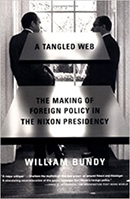
Betty Glad
Betty Glad was born on September 27th, 1927 and died on August 2nd, 2010. She earned a Ph.D. in International Relations from the University of Chicago and taught at the University of Illinois. Other books Glad wrote are Jimmy Carter: In Search of the Great White House and Charles Evan Hughes, which was nominated for a Pulitzer Prize.
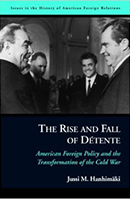
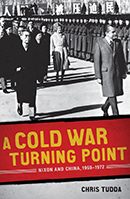

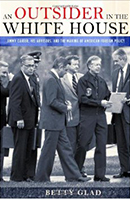
In the presidential election of 1976, a Democratic candidate running from the state of Georgia who “publicly cast himself as an outsider” won the presidency by winning over previous president Gerald Ford.1 Following the presidential periods of Nixon and Ford, the time in which Carter was elected was peaceful in terms of the Cold War, but as years progressed in his presidency, Soviet aggression and inability to cooperate led to the confrontation of the Soviets resulting in the end of Détente and a revival of the Cold War. Aside from the United States’ change in attitude towards the Soviet Union, Carter contributed to many failures as well as successes in the foreign policy arena. In her book, An Outsider in the White House, Betty Glad explains the extent of these successes and failures in the Carter presidency through a detailed explanation of key events and the decision making behind it.
Casting himself as an “outsider” while running for the presidential campaign in 1976, everybody knew James Earl Carter was going to be different from the previous “powerful” presidents of the Cold War Era. Once elected, Carter stated “he would have no ‘all powerful guard palace’ in the White House, the cabinet system would be restored to prominence in the government, and his staff would have free access to him and would be encouraged to tell him when he was wrong.”2 This statement by Carter would be the basis of what ultimately decided the Carter Administration’s foreign policy. Glad distinguishes two of Carter’s most influential cabinet members in the foreign policy team, Zbigniew Brzezinski and Cyrus Vance, as very different from each other. Vance was always careful and would use diplomacy to negotiate with others, while on the contrary Brzezinski had a hawkish attitude towards the Soviets and always seemed to be on the hunt for power. Vance’s traits helped Carter in achieving two of the major successes in foreign policy, while Brzezinski would contribute to the aggressive attitude and failures in foreign policy by making decisions on his own without the president’s consent and by gaining an influence on the president. Brzezinski was able to continue these actions throughout the most of the Carter presidency, and as a result would influence many of the president’s foreign policy decisions. Glad also deciphers Carter’s original intentions for his term, which included an agreement with the Soviet Union to reduce the production of nuclear arms, promoting human rights overseas, addressing the energy crisis, and enforcing environmental protection laws. An early commitment to one of these goals was the negotiations held to ratify the Strategic Arms Limitation Treaty (SALT II) to reduce nuclear arms with the Soviet Union. This became a part time failure due to the crisis in the Horn of Africa where Cuban troops were sent into Ethiopia by the Soviet Union and also due to the Soviet Union’s refusal to integrate human rights into their system. Brzezinski’s influence would cause Carter to abandon these goals later on.
After explaining the important cabinet members and the early commitments, Glad continues by informing the reader of the mid-term achievements made during the Carter Presidency. The mid-term achievements Glad talks about include the successful negotiation of the Panama Canal Treaty, normalization of relations with China (diplomatic, commercial, cultural), and the successful negotiation of the Camp David Accords. The United States wished to cede control over the Panama Canal to Panama in order to maintain relations with Latin America. In 1977 this was accomplished with the help of Vance through the ratification of the Panama Canal Treaty. Normalization of relations with China had been put off by Carter until the negotiations of the Panama Canal Treaty had been successful, and once it had been Brzezinski stepped back into foreign policy arena seeking efforts to get involved in negotiations involving big powers. With the recent death of Chinese communist leader Mao Zedong in 1976, a much more flexible leader, Deng Xiaoping came to power with his two goals; building up of economy and bringing an end to China’s isolation from the rest of the world. The Carter Administration’s guidelines for negotiating with the Chinese, which had been suggested by Vance, were to stay neutral in terms of dealing with Vietnam and the Soviet Union, which were on bad terms with the PRC, and to respect the well being and safety of the Taiwanese people. Although Brzezinski took his own course of action by discussing topics regarding the status of Taiwan and security arrangements with China, in which he was not supposed to, Vance’s guidelines eventually helped reach a successful agreement which kept the U.S. out of further conflict with other nations and maintained the security of the Taiwanese people. Once the announcement of the opening of relations between the two nations had been made, the Soviet Union feared the newfound relations to be a threat. Cyrus Vance “[told] a reporter from Time that the goal was to treat the Soviet Union and China equally, not create a competition between them.”3 Contrary to Vance’s point of view, Glad says that “using China as a counter to the USSR was exactly what Brzezinski had in mind.”4 Almost simultaneously as the negotiations with China, tension was rising in the Middle East between the nations of Israel and Egypt who were in an ongoing war over the Sinai Peninsula, Suez Canal, Gaza Strip, and Jerusalem. Glad talks about the Camp David Accords as being one of Carter’s greatest achievements and describes her view of Carter being an intelligent man and stresses his uncharacteristic actions of not relying on cabinet members. Both leaders of the nations of Israel and Egypt, Menachem Begin and Anwar Sadat, were unwilling to compromise their god earned right to their claimed territories. But with his determination, unwillingness to give up, and intelligence, Carter was able to craft an agreement in which both men agreed on. The Camp David Accords was then signed on September of 1978, bringing an end to the argument between the two nations. Aside from getting off to a rough start with the part time failure of the SALT II treaty, the Carter administration enjoyed successes in its midterm such as the Panama Canal Treaty, Normalization with China, and the Camp David Accords, but the presidency began to go downhill from this point on.
Following its midterms achievements, the Carter Administration was faced with crises and confrontations in the latter part of its term. In September of 1978 an uprising had occurred in Iran led by those opposing the government of the Shah. The Shah, agreeing to leave, fled to the United States and on November 9th, 1979 a group of Muslim Students stormed the U.S. Embassy in Iran and held over 60 Americans hostage. Glad refers to this as a failure for the Carter Administration not only because of their hostile disadvantages, but because they had failed to secure a relationship with a previously pro-American nation rich in oil. The crisis in Iran would triple gas prices in the nation and the American economy suffered greatly as a result. In August of 1979 the topic of a Soviet Brigade in Cuba arose. While Vance sought to find a peaceful resolution to the problem, Brzezinski, being a hard-lined Soviet fighter, wanted to punish the Soviets with a series of actions involving arms sales to China and the deployment of troops at Guantanamo Bay. The author describes this as a failure due to how it jeopardized the ratification of SALT II among congress members and further raised tensions between the Soviet Union and the United States. Lastly, in this period of downfall, the Soviet Union began mobilizing troops into Afghanistan on Christmas of 1979. The president exclaimed, “There goes SALT II.”5 The invasion of Afghanistan by the Soviet Union contributed to the failure in the latter part of Carter’s presidency most notably because of the official ending it had put to the SALT negotiations. The confrontations and crises caused by the Soviet Union, Cuba, and Iran put the administration in a tough position which negatively affected their decision making later on.
At the end of the book the author discusses the actions taken by the Carter Administration in response to the crises and confrontations. There was a rescue attempt of the hostages captured in the U.S. Embassy, Operation Eagle Claw, which was a mission led by the Delta Force, a special forces team. However after its failure, the hostages were eventually saved when an agreement was reached and the hostages were freed on the day of Ronald Reagan’s inauguration. The Soviet invasion of Afghanistan ended attempts at ratifying the SALT II treaty, revived the Cold War, brought the end of Détente, and led to the resignation of Secretary of State Cyrus Vance. To protest to the invasion of Afghanistan “the four most important nations in the world...the United States, China, Germany, and Japan [did not attend]” and boycotted the 1980 Moscow Olympics.6 As a result of not ratifying SALT II, the United States adopted the Nuclear Counterforce Doctrine, which accounted for further research and production of new nuclear weapons. Despite the chain of bad events, what ultimately decided Carter’s failure to be reelected was his failure to address economic issues at home and bring the hostages back before the presidential elections.
In this book Betty Glad theorizes that the Carter presidency had successes, but left a bad impression due to the negative effects brought by the inability of the Soviet Union, Cuba, and Iran to cooperate. Carter’s term got off to a good start with success such as the signing of the Panama Canal Treaty, the Camp David Accords, and the normalization of relations with China, but the inability of the Soviet Union, Cuba, and Iran to cooperate put Carter, who had a lack of knowledge and experience in foreign policy, in a tough position which caused him to “[fall] subject to temptations from those in his administration who fed his frustrations with calls to be tough, to threaten, to demonstrate and prepare to use force”, especially Brzezinski.7 This resulted with a change in original goals focusing on human rights and nuclear arms reduction into the utter opposite, an increase in nuclear arms and the inability to address problems at home, which disappointed the public. Glad’s conclusion implies that Carter’s presidency had its successes but left an overall bad impression due to its end results.
Betty Glad was an accomplished scholar of the American presidency, U.S. foreign policy, and political psychology, and “focused on foreign policy in the Carter Administration.”8 Several other books written by Glad include Jimmy Carter: In Search of the Great White House and Charles Evan Hughes which was nominated for a Pulitzer Prize. Having been an adult during Carter’s Presidency, she had first hand experience of what was occurring at the time, which accounts for her explanation from the public’s point of view. Glad’s specialization in the Carter Administration’s foreign policies provide an exceptional depth in the explanation of events, often referring to first hand facts spoken by Brzezinski, Vance, or Carter themselves. The analysis and interpretations made by Glad come from years of studying accurate information and facts, often being personal experiences and inside testimonies from members of the administration themselves, thus drawing up an accurate conclusion based off of various points of views.
An Outsider in the White House was published in 2009 and written over the course of “ten years, off and on, of research, writing, and Carter watching.”9 Written throughout the first decade of the new millennium, it had been over twenty to thirty years since the end of the Carter Presidency when the book was written. By this time much accurate information and documents of the presidency were available and first hand recollections were made by key individuals as well, summing up a variety of dependable sources and facts. The book was written at the time due to the Carter Administration’s sparking of the last great stretch of the Cold War and the conflict in the Middle East it introduced to America. During this time the world was just recovering from the effects of the Cold War with the liberation of people from communism and the problem in the Middle East that started out as a mere conflict had grown into a war. With the Carter Presidency responsible for the initiation of these two worldwide events it was viewed with much interest at the time.
In his review of An Outsider in the White House, Andrew K. Mengle elaborates how the successful illustration of Carter’s foreign policy shows Zbigniew Brzezinski’s significant ability to hijack Carter’s presidency. He states that Brzezinski and Vance, being the two most influential figures, yet having a lot of differences, created “internal rivalries that existed within the Carter administration’s foreign policy team” for power.10 Mengle argues that Brzezinski was victorious over Vance and “exercised undue influence over international affairs, ultimately [hijacking] his original global policy.”11
The review of An Outsider in the White House by the Cornell University Press elaborates on the book’s specific explanations for each topic as a piecing together of evidence that describes the Carter’s collegial staff as being “a ‘team of rivals’ who contended for influence and fought over his every move regarding relations with the USSR, PRC, arms control, and other crucial foreign policy issues.”12 This review recognizes the book as being very informative and accurate due to it being based off of recently declassified documents and having a source of a wide variety of interviewers. The power struggle which Brzezinski is faced with is described as a rich depiction of the relation between policy and character.
An Outsider in the White House by Betty Glad is nonetheless a very informative book with an abundance of information to back its claims. The book presents very few ideas that are opinionated and engages the reader in a story of what really happened, conveying messages through facts and personal experiences of the diplomats during the time of the presidency. Despite being very factual the book lets the reader develop his/her own opinion through the language in which Glad addresses Carter, describing his “willingness to take risks, tenacity, and ability to master detail evident in his early climb to power – contributing to his success.”13
The 1970s was a time period in which some may argue to have been a time of severe crisis and largely a continuation of the 60s, Betty Glad is one of those people. Glad describes the first portion of the 70s, with Nixon and Ford as president, as a more peaceful time due to a break in the Cold War known as Détente and the laying of a blueprint for a nuclear arms reduction treaty going underway. Glad then emphasizes on conflicts introduced once Carter takes office involving invaders in Africa, rebels in the Middle East, and the overthrow of the Shah in Iran, as the beginning of a crisis which severely conflicted the American economy as well. Glad reveals the true crisis of the 70s when she quotes Carter’s opinion of the Soviet Invasion of Afghanistan as to making “the prospects for nuclear war even greater.”14 Glad emphasizes her belief that the 70s was a continuation of the 60s by comparing the Cuban Brigade to the Cuban Missile and Bay of Pigs Crises of the 60s, which was a continuation of conflict with Cuba. Glad also compares the resumption of the arms race and Brzezinski’s hard lined anti-Soviet policies to that of Kennedy and Nixon’s in the 60s.
The book An Outsider in the White House provides an accurate arrangement of factual information to describe the series of events regarding the U.S. foreign policy during the hectic years of the Carter Presidency. Informing the reader of major events such as the Camp David Accords, Panama Canal Treaty, opening of relations with China, Iran Hostage Crisis, and the Soviet Invasion of Afghanistan, the book enlightens the reader of the Carter Administration’s successes as a foreign policy team while also addressing its failures. Despite his failures and his presidency’s lasting impression, “Jimmy Carter remains an American original.”15
Footnotes:
- Glad, Betty. An Outsider in the White House. Ithaca, NY: Cornell University Press, 2009. Page 7.
- Glad, Betty. Page 7.
- Glad, Betty. Page 120.
- Glad, Betty. Page 120.
- Glad, Betty. Page 197.
- Glad, Betty. Page 211.
- Glad, Betty. Page 256.
- M, David Rudd. Betty Glad: A Woman’s Woman. Salt Lake City, UT: University of Utah, 2012. Page 1.
- Glad, Betty. Page ix.
- Mengle, Andrew. Review of an Outsider of the White House. West Point: Armstrong Undergraduate Journal of History, 2014. Page 1.
- Mengle, Andrew. Page 1.
- An Outsider in the White House Review. Ithaca, NY: Cornell University Press, 2015. Page1.
- Glad, Betty. Page 143.
- Glad, Betty. Page 148.
- Glad, Betty. Page 286.
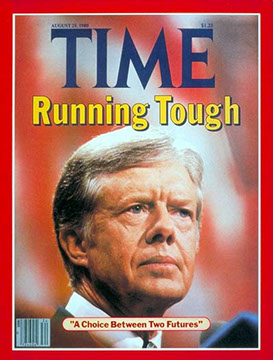
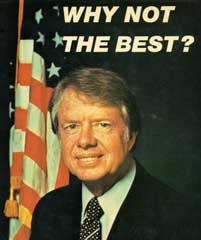
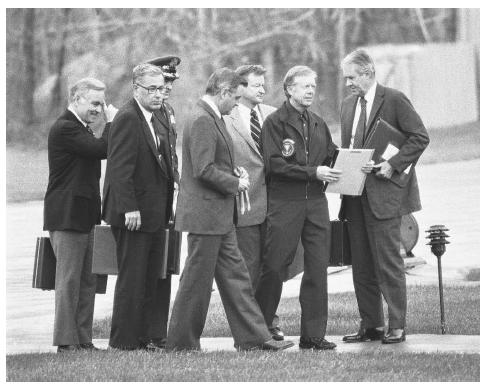
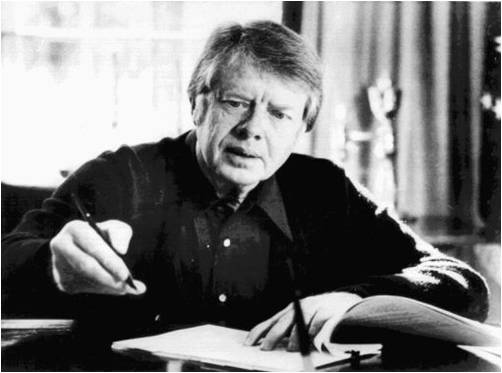
1 - 4
<
>